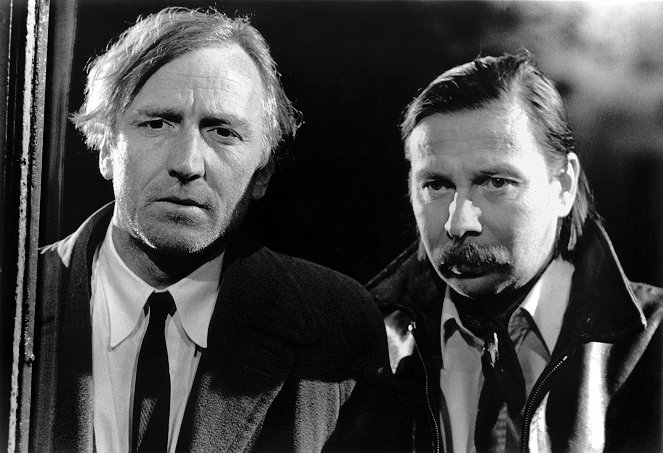Directed by:
Aki KaurismäkiScreenplay:
Aki KaurismäkiCinematography:
Timo SalminenCast:
Matti Pellonpää, Evelyne Didi, André Wilms, Kari Väänänen, Christine Murillo, Jean-Pierre Léaud, Carlos Salgado, Alexis Nitzer, Sylvie Van den Elsen (more)VOD (2)
Plots(1)
A witty look at life from the perspective of some starving artists. Comic events involve love, work, and of course, art. (official distributor synopsis)
Reviews (6)
My first encounter with Aki Kaurismäki and right off the bat, one of his most difficult movies. It was amazing to watch the emotions and actions of those French bohemians. One might think that they’re nuts. So what, they really are nuts. Eventually, fate catches up with them and at that point, it doesn’t even matter how careless they are about the world around them. I must also applaud the amazing black-and-white atmosphere of the Parisian streets. It was a joy to watch them and it helped shape the atmosphere a lot… obviously.
()
Though it is set in Paris, The Bohemian Life is an excellent demonstration of the characteristic creative signature of a leading Finnish director. A mournful atmosphere. Long black-and-white and predominantly static shots in which there is not a single object too many. Silences, fade-outs and flashes of humour here and there. Solitary scenes instead of a smoothly flowing narrative (Kaurismäki doesn’t usually film in this manner; we could look for the reason he does so here in Murger’s book on which the film is based, which was serialised as episodes from the lives of Parisian bohemians). We have to fill in the gaps between them ourselves. With stoney faces, the actors speak lines whose message is absurdly simple and direct (“I'm out of coffee, but I'll make soup”), not encrypted in ambiguous metaphors. The characters don’t stick with courteous phrases, as they speak about things that can explain their bohemian nature. They live for the present moment. The individual scenes are like branches stripped of excess verbal leaves. We can find similar minimalism in the works of Jarmusch and Bresson, to whom Kaurismäki refers at one moment (the pickpocket), but The Bohemian Life is more nostalgic and thus somehow pleasantly sorrowful. Kaurismäki does not use the problems of living a life of freedom for the purpose of caustic criticism of social conditions, nor does he overly simplify those problems. The director does not avoid serious matters, nor does he revel in analysing them. The serious is present in his films just as simply and naturally as the frivolous (somewhat along the lines of “pessimist in mind, optimist at heart”) and which aspect we give more weight to is up to us. Based on that, the film’s ending can be interpreted as a definitive resignation to ideals as well as a hopeful step in a new direction. 80%
()
Proud but painful misery. Compassion and vanity. A beautiful rhapsody about poor "artists" whose greatest art is life itself - polite, unconditional, ceremonial in every bar. This is probably Kaurismäki's most tragic film (if we set aside last year's Le Havre) and also one of his directorial highlights.
()
I like Kaurismäki's melancholic comedies set in an urban environment and shot in black and white. However, Aki's penchant for melodramatic tragedy with increasingly swelling sentiment is a big problem for me. In The Bohemian Life, you can find both - I value the first half more, where the comedic elements are more prevalent. The second half wants to be moving. I must note that I have always had a distant attitude towards bohemians. I considered them pleasure-seeking and hypocritical. No matter how alternative they appeared, they were dependent on the bourgeois surroundings that sustained and protected them. The film can be regarded as a tribute to the artistic environment of which Kaurismäki was a part. And it is also an expression of respect for his partner, Paula Oinonen, who is the author of the paintings by the painter Rodolf. For me, the director's work with the environment is probably the most interesting aspect. His selection of interiors and exteriors allows for creating an illusion of timelessness and connecting 19th-century Paris with the modern era. For a moment, you feel like you are walking the streets of the 1930s with the typical characters of the Parisian outskirts and then suddenly stop on the sidewalk next to a modern car. Overall impression: 75%.
()
Did Malevich's "Black Square" deal a deadly blow to painting as such and does the painter Rodolfo admit it? And yet he still continues to paint? This is called a love for creation as such, a love that all the main characters have more than enough of. However, it does not mean that there is no longer any room for human love. It can only be torn from a life in timelessness when the surrounding world speaks up, in the form of money, from which (unfortunately) artists must draw their livelihood. A funny, melancholic, and at the end bittersweet glimpse into the lives of three men who could have lived both 150 years ago and yesterday.
()
The main reason I like Aki Kaurismäki's film is that the visuals he used are a perfect match for the story presented. Black and white cinematography doesn't suit every film nowadays, but if an author decides to use it, they usually have a good reason for it. Aki Kaurismäki knew this and it makes the film nice to watch. Plot-wise, it may not necessarily be captivating.
()

